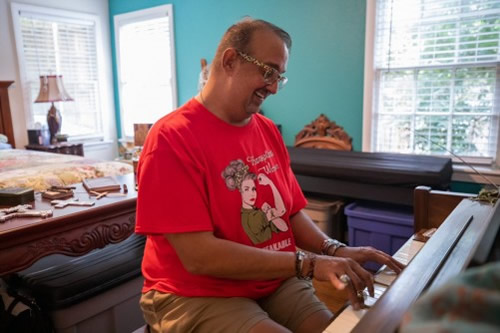UTSW performs first HIV-positive-to-HIV-positive organ transplant in Texas
 After recovering from his transplant surgery, John Welch has returned to hobbies he enjoys, such as playing the piano.
After recovering from his transplant surgery, John Welch has returned to hobbies he enjoys, such as playing the piano.
Photo: UT Southwestern Medical Center DALLAS, Sept. 2, 2020- Less than three weeks after getting on an organ transplant list for HIV-positive patients, John Welch got the call. A liver was available from a deceased donor, and it was an excellent match.
On July 1, the 53-year-old Dallas man became the first recipient of an HIV-positive-to-HIV-positive organ transplant in Texas at UT Southwestern’s William P. Clements Jr. University Hospital.
“The organ I got was from a young man, and I think it’s rejuvenating this old, tired bag of bones. Maybe I’ll be 25 again,” Welch says with a laugh.
A team of transplant doctors, surgeons, and infectious disease specialists completed the surgery without complications. UT Southwestern physicians have performed more than 3,000 solid organ transplants.
“I had the utmost confidence in the team at UT Southwestern. I never had better treatment,” says Welch, now recovering at home. “Everyone there is genuinely concerned and really cares about the patient.”
His condition is a happily stark contrast from where he was in 2016 when he learned on the same day that he was HIV-positive and had cirrhosis of the liver. He quit drinking alcohol for good and started taking antiviral medication to keep HIV at bay.
Welch’s liver transplant took place under the HIV Organ Policy Equity Act, or HOPE Act, a federal law that allows HIV-positive people to become organ donors by matching them with HIV-positive recipients. Before the law was passed in 2013, hospitals were prohibited from taking organs from HIV-positive donors. UT Southwestern’s status as a prominent academic medical center qualified it to become one of the sites in which HOPE Act transplants can take place under the auspices of a clinical trial.
“If he had not had access to this organ, he would have probably had to wait a much longer time to get his liver transplant, and he would have gotten much sicker,” says says David Wojciechowski, D.O., medical director of the Kidney Transplantation Program and an associate professor of internal medicine and surgery.
Before the transplant, Welch was in the early stages of liver failure, suffering from mild confusion and memory loss. Now, except for medication and follow-up appointments, doctors expect a near-normal life for Welch, in part because nearly all of the other 115 organ recipients in the HOPE program nationwide have enjoyed strong recoveries.
Wojciechowski led the transplant planning efforts, while the patient’s HIV status was tended to by Ricardo La Hoz, M.D., an infectious disease specialist and an associate professor of internal medicine.
“We use all the information that we have available on the donor and the recipient to design an HIV therapy that will cover both,” La Hoz says, explaining that his team will continue to monitor the patient’s test results to make sure that the HIV infection stays controlled. If it does not, the antivirals will be adjusted. La Hoz says that to date no patient who has received an organ transplant under the HOPE Act nationwide has developed uncontrolled HIV infection, known as HIV virologic failure.
Wojciechowski says the organ donor had been recently diagnosed with HIV and was not on any antiviral medication. This means he would not have built up any resistance to the medication, which bodes well for the recipient.
Welch says he found it meaningful that he got the call about an available organ during Gay Pride Month, and he wants his case to stand as an example.
“I want to do something with purpose,” he says. “What I want to do is raise awareness that HIV-positive people can be organ donors, and I am a walking testament to that.”
Welch says his trust in UT Southwestern doctors stemmed from a nearly fatal case of pneumonia he had in late 2016. Hospitalized at Parkland Memorial Hospital, he was so ill that he lost 90 pounds. He noticed that the doctors taking care of him wore ID badges that identified them as UT Southwestern faculty and, he says, “They saved my life. They absolutely saved my life.”
As he follows up with his UTSW team of doctors, Welch is taking every precaution he can to avoid SARS-CoV-2, the virus that causes COVID-19. He recently had a piano delivered to his home to play the gospel music he enjoyed as a child in church in Louisiana, and he looks forward to returning to his hugely supportive circle of friends and his hobby of restoring antique lamps and jewelry.
“That space in between birth and death is for living and loving and all those things that bring joy and happiness to the world,” he says.
###
About UT Southwestern Medical Center
UT Southwestern, one of the premier academic medical centers in the nation, integrates pioneering biomedical research with exceptional clinical care and education. The institution’s faculty has received six Nobel Prizes, and includes 23 members of the National Academy of Sciences, 16 members of the National Academy of Medicine, and 13 Howard Hughes Medical Institute Investigators. The full-time faculty of more than 2,500 is responsible for groundbreaking medical advances and is committed to translating science-driven research quickly to new clinical treatments. UT Southwestern physicians provide care in about 80 specialties to more than 105,000 hospitalized patients, nearly 370,000 emergency room cases, and oversee approximately 3 million outpatient visits a year.
Media contact: Newsroom
214-648-3404
news@utsouthwestern.edu
Source: https://www.utsouthwestern.edu/newsroom/articles/year-2020/hiv-positive-to-hiv-positive-organ-transplant.html
"Reproduced with permission - UT Southwestern Medical Center"
UT Southwestern Medical Center
For more HIV and AIDS News visit...
Positively Positive - Living with HIV/AIDS:
HIV/AIDS News
|